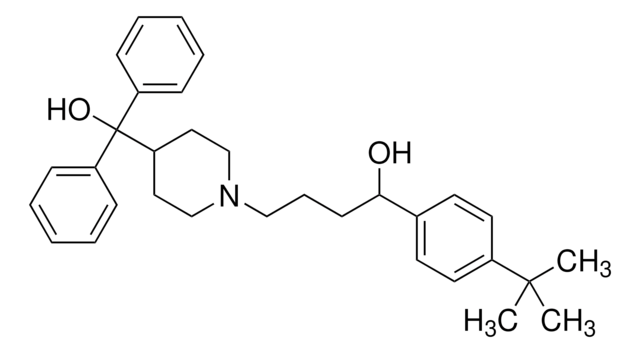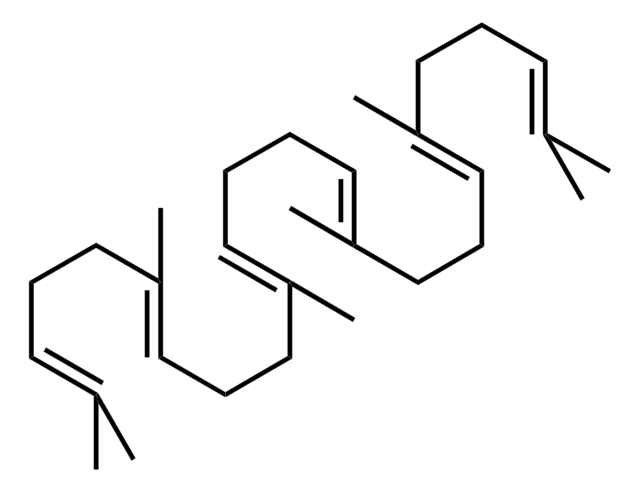C1758
Coconut oil from Cocos nucifera
low-melting solid
Sinonimo/i:
Coconut fat, Copra oil
Autenticatiper visualizzare i prezzi riservati alla tua organizzazione & contrattuali
About This Item
Prodotti consigliati
Origine biologica
Cocos nucifera
Livello qualitativo
Stato
low-melting solid
Punto di fusione
23-27 °C
Tipo di lipide
oils
Condizioni di spedizione
ambient
Temperatura di conservazione
room temp
Cerchi prodotti simili? Visita Guida al confronto tra prodotti
Applicazioni
- Linseed, Baru, and Coconut Oils: NMR-Based Metabolomics, Leukocyte Infiltration Potential In Vivo, and Their Oil Characterization. Are There Still Controversies: This research utilizes NMR-based metabolomics to explore the biochemical properties of various oils, including coconut oil, and investigates their potential for leukocyte infiltration in vivo. The findings contribute to understanding the health implications and biochemical interactions of coconut oil (Figueiredo et al., 2022).
Stato fisico
Usually a solid at room temperature
Codice della classe di stoccaggio
11 - Combustible Solids
Classe di pericolosità dell'acqua (WGK)
WGK 1
Punto d’infiammabilità (°F)
>235.4 °F - closed cup
Punto d’infiammabilità (°C)
> 113 °C - closed cup
Dispositivi di protezione individuale
Eyeshields, Gloves, type N95 (US)
Scegli una delle versioni più recenti:
Possiedi già questo prodotto?
I documenti relativi ai prodotti acquistati recentemente sono disponibili nell’Archivio dei documenti.
I clienti hanno visto anche
Young Taek Oh et al.
Physiology & behavior, 167, 194-201 (2016-10-25)
Previous rodent studies showed that when injected into the brain, free fatty acids (FFAs) reduced food intake in an oleate-specific manner. The present study was performed to test whether food intake is regulated by circulating FFAs in an oleate-specific manner.
Jingcan Sun et al.
Food chemistry, 141(3), 2828-2832 (2013-07-23)
Ester synthesis was carried out in a solvent-free system of lipase, coconut oil and ethanol or fusel alcohols to ascertain the reaction mechanism. During ester formation, octanoic and decanoic acids increased initially and then decreased gradually, indicating that ester production
Xuezhi Ding et al.
Tropical animal health and production, 44(7), 1541-1545 (2012-03-01)
The objective was to evaluate the effect of dietary coconut oil on methane (CH(4)) emissions and the microbial community in Tibetan sheep. Twelve animals were assigned to receive either a control diet (oaten hay) or a mixture diet containing concentrate
C Reveneau et al.
Journal of dairy science, 95(4), 2061-2069 (2012-03-31)
Feeding animal-vegetable (AV) fat or medium-chain fatty acids (FA) to dairy cows can decrease ruminal protozoal counts. However, combining moderate to large amounts of AV fat with monensin (tradename: Rumensin, R) could increase the risk for milk fat depression (MFD)
M Hollmann et al.
Journal of dairy science, 95(5), 2602-2615 (2012-05-01)
To determine if dietary medium-chain fatty acids (FA; C(8) to C(14)) may mitigate enteric methane emissions, 24 cows were blocked by body size (n=2) and randomly assigned to 1 sequence of dietary treatments. Diets were fed for 35 d each
Il team dei nostri ricercatori vanta grande esperienza in tutte le aree della ricerca quali Life Science, scienza dei materiali, sintesi chimica, cromatografia, discipline analitiche, ecc..
Contatta l'Assistenza Tecnica.








